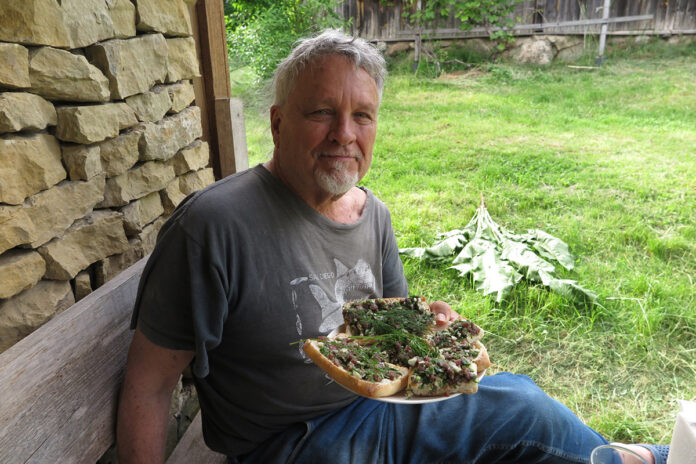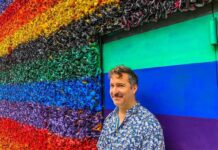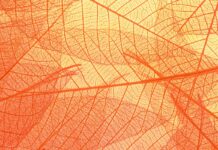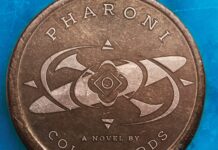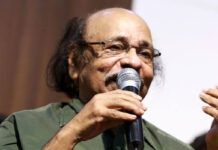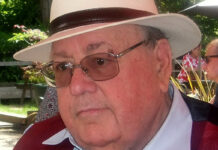Tell us about the early part of your life and how this is reflected in your poetry, later. And what about sports…you were, we hear, a gifted athlete in squash and tennis.
Well, though I grew up in a small city, much of my free time was spent in large lot back of the duplex house where there were countless animals and insects, and in the woods at South Mountain
South Mountain
“what must I sing”
I will settle in South Mountain.
Passers-by call it the Blue Mountain
though it’s orange as a phoenix in Autumn,
and in Winter grey and barren.
There all the apples are windfallen
and the women electric and cloven.
I will settle in South Mountain
where flocks of shorn stars are gathering.
The sun skirts the trees in a fountain
of light, the moon in creation’s green.
I will settle in South Mountain
where whippoorwill and nightingale mingle to sing.
I will settle in South Mountain.
No angel fallen or risen
could ever begin to imagine
better bearings to awaken Eden.
I will settle in South Mountain.
No gate there or grace or praying
to separate Hell from Heaven.
The unborn and dead call it the Blue Mountain.
where my family had a hunting cabin that my dad at the age of 12 and his stone mason uncles had built from rocks in the area. I was close to my dad. He was warm and when not working, was devoted to my brother and me, taking us fishing and hunting, playing sports with us, quietly loving. He did not have much of a formal education, but he knew some poems by heart, and would sometimes recite them at the kitchen table. I think my attachment to him made it easy for me to follow my own proclivity into the turf of the Muse. There was nothing ever Oedipal about our relationship. Why I got goose bumps when hearing poetry is another matter and maybe never to be understood, but the path was there, and in some way also connected to the sermons at Church with the choral music. Our Pastor was a hunter, and this intrigued me. Fishing with my father, the quiet waiting for the golden fish or the Leviathan, the beauty of flowing water and still water, all this was a part of his gift; as was hunting, especially deer hunting with the stalking (not the walking), and the stillness in the forest from sunrise to sunset, cold and shivering but waiting, waiting, alert for the visitation of the deer to my stand under a pine tree. And under the tree, I would mumble stories to myself, talk even to the pine needles. Muse and deer, deer and Muse became for me indistinguishable, aqueous, nearly androgynous as Christ, and though I only hunted buck, somehow the Other creature was feminine, with whom one dances the poem, the Lila (Play as in Hindu metaphysics) the Game, in the Clearing in Heidegger’s Black Forest.
I am told that these early experiences, the taste and touch of them, never leave us and are paramount in our psyche. This may be very true, and I do think that words are coupled with the senses, and the early life of the senses, the smells and colors, the touch of the fur of a pet, of a dead rabbit you have just killed, and then eaten, that cycle of love and death. As for rhythm, maybe it is connected to walking and later also to dancing. I know that even today, I often feel a line of poetry when I am walking, and many a note toward a poem was jotted down while walking, the feet breathing.
As for sports, I was not gifted, but I was focused and tireless, and aggressive and discipline – when thinking of this now, only the focus may be important to the poem, but not as something that came to my poetry from sports, but just a parallel within the personality. Perhaps something Zennish about it…. the focus and precision becoming natural and finally unconscious and quick, the way I can and do write early drafts of poems now, hardly aware of technique, the craft and discipleship implicit. Eventually I began to “choke” in sports, because winning became too important, proving myself….whereas in poetry this was never an option…..I compose because I love to compose.
All of the above was very much my lyrical training and background, from birdsongs to the dense forests of Appalachia, almost like rainforests in lushness, ferns and moss and the secretive Lady’s-Slipper. For some inexplicable reason, my row house home in the city never was important to the poetry until much later when I became more rootless, and lost for a long time the close affinity to the plants and animals around me there near my home. They have stayed in much of my poetry because they are in the blood of my memory, but the urban, too, finally took some purchase… I often think of it as Bob Dylan going from acoustic to electric, though I continued with both I didn’t want the latter, the ecstatic-hyper rhythms, but it happened and I’m okay with the outcome. Few of these hundreds of poems have ever been translated—their leaps and cadence a translator’s nightmare. Now, many years later I am once again back in the forest when not in Vilnius, and the poems reflect that.
After you went to the university, in a break period you travelled for the first time to India. And this was, too, an interesting time in your life – could you please tell us about this.
I took a leave of absence from the University to join the Peace Corps and work in agriculture in India… I wanted to be in the countryside again, far from my beloved pool halls in Philadelphia, from the University which I had a hard time adjusting to, from an overbearing mother. My previous schooling hadn’t prepared me for the Ivy League, and I was also emotionally fragile, and so going to India to work was, in part, an escape, and in part an ethical choice….though the flower children were just coming into bloom, I was too blue collar and too much a loner to join in, and so India became my testing ground, and where I finally immersed myself in a wonderful array of books and smells and colors beyond anything I could have imagined beforehand. Tagore’s works were devoured, but more importantly the discovery of Garcia-Lorca and then many of the modern and contemporary Spanish language poets. I can’t say I did my social work very well in India, but I almost drowned in the hundreds of books in a book locker the Peace Corps provided, and I also began to cavort nearly unrestrained with the Banjaras and shepherds, loose women, and jailbait school girls—after all, I was only 20. And there was the cultural impact of a way of thinking and living so alien to the West. I absorbed it without imitating it. I have never looked to the East for so-called enlightenment, but only for more knowledge. I wasn’t clueless on arrival since I had begun to read Hindu and Buddhist texts at the University of Pennsylvania ( a great Sub-continent library at Penn), and so had hoped to go to the Orient as a Peace Corps volunteer. Not searching, but fascination. And I ended up living quite close to the stomping grounds of Nagarjuna in Devarakonda (Hill of the Gods) in South India.
Nagarjuna
Arjuna, born under a tree.
My maple all fire in the Fall?
Slithered with snakes for three months.
Rattlesnakes in these dialectics
or the hood of a cobra hiding
a world of stars?
Body, a pure diamond. Mind, a pure body
of discontinuous continuity.
Did he just walk down the road,
the seven wheels of his spine a walking stick?
At death, locked himself in a room,
and when the door was rolled aside,
out jumped a cicada.
Sunlight shines through the cicada’s wings,
and I wonder if the body left behind
is the true body, the dust of our brief dialog
with the Earth, no coming, no going.
whose proximity became important after my return….all leading to deep readings in the Tao, and Shankara, and the Chinese poets and what I could scavenge of the apocryphal tales of the Bodhidharma, and then later a profound influence from Jung, Eliade, Thoreau, and Whitehead, etc.
After you came back, and graduated with a B.A. and M.A., in 1970, some readings of some poets which are important for your perception of the poetry?
I could make a huge list since I became a voracious reader…even when walking the streets of Philadelphia I often read…kind of predating the youth nowadays with their eyes locked down on their mobile phones. Partly this was because I wanted to probe the World of Letters as much as possible before dying, to learn everything… from adolescence on, I thought I had only a few years to live. My first poem at the age of 8 was about Time passing, a Clock. Why? No one will ever know…teleology is a mysterious world of its own, and humans should not dip too deep since the purpose of all of us may be only to die. I have been asked this question about poets so many times, and each time the catalog changes because I don’t feel I have the recall or even the time to make it thorough. Now I will just nutshell the poets who Remain or who have become very important to me over the years for their poetry, not as writers in other genres (Pound for example): Neruda; Yeats; Dante; Shakespeare; Seamus Heaney; Michael Jennings; Robert Bly; Cavafy; Emily Dickinson; King James Bible; George Szirtes; Hayden Carruth; Dylan Thomas ( Dylan when I was a young poet was very important but not now); Garcia-Lorca; Salvatore Quasimodo; Antonio Machado; Yannis Ritsos; Wallace Stevens; Miłosz; Homer; Archilochus; Philip Larkin very recently; the Tang and Sung poets; Kenneth Rexroth; Lêdo Ivo; Osip Mandelstam; Denis Johnson; Georg Trakl; Rilke; the ‘author’ of the Bhagavad Gita; Du Fu; Thomas Traherne and John Donne; Ezra Pound’s Cantos; Borges; Ovid; Cold Mountain; Z. Herbert; Sigitas Geda; Jennifer Foerster; W. S. Merwin; Keats; Pavese; Vallejo; Marina Tsvetayeva, ETC. And as close friends over the years who are poets: Craig Czury and Jane Todd Cooper, and currently Leonard Kress.
How did your first book come about, and later what were your next steps in writing?
My first book was Swallowtails Gather These Stones in the early 70s; the Canadian poet, typographer, translator of Native American poetry, and polymath, Robert Bringhurst and I put it together with his nascent press, sewing and binding the copies in my hunting cabin on Route 233 near Pine Grove Furnace, Pa. Bringhurst was Very important for me…. his early friendship as a poet and correspondent, and his vast knowledge and interests and elitism. Many books have followed. I just write and write and then cull a collection together. Only two books have had a preconceived format: Tao te ching Meditations: Bones & Buzzards; A Gathering of Smoke, Gopiah’s South Indian Prose-poem Journals, a polyphonic Epic I composed beginning with notebooks I kept while in India. It was Gary Snyder who urged me to do this when staying with my wife and me in New Bloomfield and later at Oak Omolú in Pennsylvania. Now I am working on another manuscript, Dogpatch Poems, semi-biographical, where I develop an embellished persona using material and life-experience both from Appalachia and the tiny village of Šnieriškės in lake-forest country, Lithuania.
Drafts
My new occupation here in the timbers
is to have an IPA, preferably non-filtered
with supper, later to drink at least a shot or four
of homebrew and a glass of berry wine,
and then to draft a topsy-turvy poem
if the skeeters and ticks leave me alone.
When you are as simple as I am
simple-minded with the angst and burden
of horrible memories gone into the cups
or lost in some gulch in the cranium,
it doesn’t take much more than a nap
around sundown to make you happy.
It’s a lot of work for my sort
so once a month or so I have to resort
to abstinence just to recover my balance.
I didn’t apply for the job but got taken in
by a wise old tippler as an intern,
and then advanced up the ladder
to this venerable top-shelf position.
Others around the Dogpatch, prefer
less dodgy toil like fishing or gardening
but they respect my shadowy vocation.
That’s how it is with poets at large
in these parts, kicked outside the largesse
and dry dialectics of the Republic,
trading a rhyme or two for a minnow,
filching a few cukes from a garden.
Dogpatch Poems is the working title.
About 15 years ago, I began to write plays and short fiction, and have published most of these only in Lithuanian. In addition, many songs and some flamenco lyrics; two books for children; translations from the Portuguese and Lithuanian.
Why did you go to Rio. Tell us about that time, till 1977, and then, when you came back to Pennsylvania and later departed for Salvador, Bahia, again in Brazil?
While a student at the university, I saw the film, Black Orpheus, and said to myself, I must go and live in Rio. So I did for 3 years, teaching English part time; writing; loafing on the beaches; involved a bit with Macumba, connecting with the Orixás, Exu, Iemaja, and Omolú; translating; learning to dance the samba like a pro. I left because the Brazilian government was making it tough to leave if you had a “green card”, and I thought it best to get out while I could since my dad was getting old and I wanted to be near him and the woods again. I also feared that if I stayed I would become very decadent: you know the story — ‘rhythmic’ women; drinking cachaça on the beaches with nearly naked Ipanema girls; and just hanging out; the fantastic rhythms of the city; the rainforest right at my doorstep; hedonistic ennui. Then, in Pennsylvania again in another cabin, this time on Warm Springs Road in the hills of Perry County, followed by a separation not of my choosing (but my fault) from the love of my life, and as a consequence the itch to get away and travel. By then, I had done a lot of reading of Brazilian literature and had published an anthology of contemporary North American poetry translated into Portuguese by a wonderful array of Brazilian poets. João Cabral de Melo Neto and Lêdo Ivo were big influences and the latter assisted in my getting a Fulbright to return, this time to Salvador, a city I particularly loved due to the music, Tropicalismo, Samba de roda, the capoeria ambience and deep-rooted African culture with the masks, and dancing in the upper semi-bordello at the Cantina da Lua, forró, and afoxé which is a Candomblé rhythm. And furthermore, it was also the home of Gilberto Gil and Caetano Veloso. All this music drew me since I had first danced in public school to the Black (Negro then) bands of fellow students and was addicted to Soul Music and Motown, Aretha Franklin, James Brown, Sam Cooke….. dancing was a passion, later on merengue (not salsa), and cumbia which I learned in Honduras in the arms of Juana (Pavon) la Loca. Jorge Amado sent a greeting-letter to me in the USA when he heard from me I was coming to live in Salvador. He mentioned some colleagues of his I should meet, and suggested I stay in his neighborhood in Rio Vermelho, so this was another impetus to really return….. again it was the beaches, the wilder interior, and the caipirinhas all over, and too much like a Koranic Paradise with fallen virgins, but soon I was glad to escape that Garden to return to my more austere surroundings and productive life in Perry County, PA. I lived in a cabin again, working only part time for a salary, writing and reading hours on end, fishing for pickerel, sunfish, and bass, a little herb gardening, socializing with the plants, ticks, and animals and birds and local musicians, bikers, and friends…it was a scene of sorts: poetry and blues; a speakeasy at Dan’s in a half-dry county; a roadhouse called Pandemonium, Al’s Lodge, booze and back-to-the-landers; wild piss-drunk parties; the breath-police far-away, a freezing outdoor shithouse, and writing my butt off.
You were always attracted by philosophy, knowledge, be it Chinese, Indian or Western …
Yes… more often I buzz into writing a poem while reading philosophy than while reading a poet… a kind of trance state from the conceptual energy. Especially for a while, thinkers like Husserl and Jaspers, Heidegger; Camus and Orwell; of course Nietzsche; Robert Bringhurst; Ho Chi Minh; Indian philosophy; Yoruba oracles and religion; Shestov; Levinas; Weil; Nagarjuna; Christian mystics, Taoism; Russian literature; Jung; Vico; Goethe; Merton; Thoreau; Marcuse; John Muir; the pre-Socratics; Sutras and the Vedas; Gary Snyder; books on Prosody; and later the discovery of Chuang-Tzu who has become my one and only Maestro. All the time reading lots of Natural Science, and studying books on local fauna and flora, butterflies, Native American lore; minerals; fishing and hunting guides, herbal powwows, Etc Etc.
How do you go about writing poems?
I compose and then write down the compositions. Rhapsodies; sonnets; rhymed or not rhymed verse; iambics and rhyme come naturally to me but I have to throw roadblocks in their way; light verse; vulgar; vernacular; formal; Anglo Saxon gruff accents; Latin flow; whatever the internal rhythms or daemon dictates. Sometimes I hear chamber music, sometimes an orchestra. Often I ghost another poet, stealing and imitating; I usually ‘go with the flow” and don’t block it…. it is really a matter of the dance with the Muse (daemon), what the Muse wants, tangled and twined with our desire. A review of my most recent book, Black Ice, published in May of 2020, mentions that I fall into the “deep image” school…..well, that may come close.
Music and poetry had an important place in your life from 1970 till 1990, around. And in a way they are still so, today. How do you see this period for your poetry, for your writings?
I can’t sing but I love song, and especially blues, jazz, and flamenco and opera arias. All of these have infused my poetry. I recite my poems now mostly for an audience whose native language isn’t English, and so this curtails what poems I read, and how I read, and the pronunciation I need to be better understood, since for me semantics remain important, as much so as sound. My oral delivery is more forged than I would wish, more enunciated. I try to put the poems on the written page so that the accent and line breaks can be heard as I hear them, but this is futile in most cases since currently in American poetry it is phanopeia that counts, so much easier to fast-food it into a global market.
Till you arrived in Lithuania, your travels through Europe helped you to meet some poets. Tell us about some of the most important meetings.
Very few. Most of the European poets and writers I had met while in the USA at the IWP in Iowa City where I was both an attendee and an ombudsman of sorts. Later on, I met some of the writers again in Europe. Tomaž Šalamun was an exception..,
Tomaž Šalamun Is A Monster
for the Maestro, and dear friend
Tomaž Šalamun ate Jeffrey Dahmer in his dreams
and rode side-car in Iowa with Larry Levis and Thom Gunn.
He married Marushka inside a bottle of milk.
He taught the unteachable
by exposing himself inside a sandwich.
He French-kissed Warhol’s Mona Lisa
while stealing her moustache for an implant.
His father was an hermaphrodite from the bottom of the Karst,
and his mother, Uncle Sam.
He ate ashes from the debris
of the World Trade Center
and shat them in the forests of Slovenia.
He laughed too much and smiled at babies.
Brandishing a tangled handful of desire,
he paraded along the Ganges in a sari.
Tomaž Šalamun sports a black necktie in his grave.
Tomaž Šalamun’s shadow swims
through the mirrors of Ljubljana.
How could one miss this omniscient magician
when he’s everywhere under our boot-soles.
Send his spirit to the Kitchen for chipotle and flamenco.
A toast of white wine to his glittering eyeglasses!
but don’t give him band-aids, don’t pray for him.
Tomaž Šalamun is already a constellation.
He’s riding the back of a dolphin in Heaven.
We met in Slovenia while I was travelling with the American poet prodigy, John Burns. We drank ourselves silly on white wine and became fast friends, influencing each other’s poetry, or rather he much admired my rhapsodic poems, and I read his poems in order to loosen up my own when I felt I was falling too much into a dull pattern of the expected trope. Lithuania has two major poetry festivals. Lots of international poets attend. And this is where I have met most of the European poets I know. For me, meeting Seamus Heaney was important, and to drink with him, even the small talk. I admire his depth, his craftsmanship immensely. In Lithuania, Kornelijus Platelis and Eugenijus Ališanka became friends and colleagues and remain so, both are superb poets. The English poet, George Szirtes, has become a true colleague in letters. Robert Minhinnick the Welsh poet would now be a close and convivial friend if Wales were not so far away…we hit it off as near brothers in Lithuania some years back. Well, nothing much significant regarding the question. Recently, I’ve become more and more the loner ever since having children in Lithuania, and prefer socializing with my kids, myself, village neighbors, or artists in the other arts.
In Lithuania you found a place, you have family. In what way has this changed… or not your poetry after establishing in Lithuania?
No change in the poetry except more of the content has become Lithuanian, images, references, things. What did change is that I started to write fiction, plays, and to perform with Fluxus dissonant, free-jazz musicians….and so when performing in such venues, the delivery of the poetry has changed considerably……….I deconstruct and ad lib with semi-scored connotations or whatever comes into the mind or rhyme while on stage….. less of this at the moment since for some years I have not performed with the Captain of that Ship, Vladimir Tarasov, and my own Nada Quartet with the sax man Liudas Mockunas and contra bass and keyboard are in mothballs, having succumbed to lethargy on my part as I pass more and more of my time hanging out at the “Dogpatch” in lake/forest country, mushrooming, ice-fishing, moonshining, and writing manuscript after manuscript of Facebook published poems.
From all your travels in all places which is more in your heart and why?
A difficult question with no specific answer. Now I live most of the year in Vilnius and a dogpatch village out of a fairyland, Šnieriškės in a regional park, and they are in my heart. As for other places, I suppose the woods and creeks and rhododendron around the stone hunting cabin in the Blue Mountains of Pennsylvania where the Wild became my rite of passage. As for urban turf, a hillside tiny two-room shack in Vila Isabel in Rio de Janeiro near the booming batucada of Praça 7, home to Martinho da Vila.
You translated into English poets from different parts of the world. Recently you worked with Ming Di (Mindy Zhang) to publish an interesting Chinese poetry anthology. Translations have an important place in your life, elaborate a bit on this.
The most important for the larger audience it will reach is New Poetry From China, 1917-2017. And many of the poets are extraordinary. Also, the Selected Poems of Sigitas Geda, Biopsy of Winter. Geda was and is the premier poet in Lithuania. Though the book was published in Lithuania shortly after independence by a prominent press, they knew zilch about marketing, and could not do international orders. It has simply vanished. Another book dear to my heart, is Landsend, the Selected Poems of Lêdo Ivo.
Tell us about your dramaturgy.
The plays began as short fiction, and soon I created theatre-stage versions for many of them. So, I will summarize all of this here. I call the fiction and plays, Wonderscripts. Maybe because I have often wondered what they are as they are told to me while I write them and before I twist them through innumerable drafts – fables, Märchen, farces, parables, yarns, projections on a wall. Perhaps because I’m a lyrical poet not accustomed to spinning narratives, I’ve watched and listened to these tales with some consternation. Where are they going, what will happen, why are they so dark and brutal at times, so full of loneliness, and then suddenly so light and absurd. I can grasp all of this in the syncopation of a poem, but these scripts arrive when I put the iambics aside – late night obsessions, and so many seem to be conversations with Hanuman, or Tertium Quid, to steal the title of a recent book of poems. The Wonderscripts began as simple prose ruminations put down in pen, or did they? No, I should say they started long ago when as a child of 4 or 5, I would sit on my mother’s bed and at her beckoning made up stories that went on and on as she listened in, wondering where it all came from. Those stories aren’t in the texts, but the flow is (the riff only a stuttering pause) as line follows line, or word upon word, a thousand-and-one because there is no stopping. Recently, I’ve been recasting some pieces or creating new ones for the stage in Vilnius, the current heart of the theatre in Europe. Turning them into short, one-act monologues. Freedom, Home, and Belongings were recast for 3 actresses to perform in one evening – a medieval Passion play Trilogy of their dreams or nightmares. There are also a few prose poems. And as I wrote down some of the more farcical pieces, I saw them as films – black-and-white shorts. Many of them were published in a tome of a book in Vilnius with the Lithuanian title, Pienas (Milk): films in black and white, theatre in a book, the bound author, conversations and characters on the pages, all waiting for someone to make them figures on the move once again.
Any projects these days of the Plague?
My projects. None, other than soon to get vaccinated against the Wuhan virus, and to just write and write. And finish editing a book of my Selected Love Poems, Shoelaces for Chagall for publication in Germany in German. And the latest endeavor is to learn how to best catch Leviathan in the lake at the Dogpatch.
Poems By Kerry Shawn Keys
About Kerry Shawn Keys
The fountain of Kerry Shawn Keys’ poetry is in the Appalachian Mountains, urban America, India, Brazil and Lithuania, but the roots go worldwide. From 1998 to 2000, he taught translation theory and creative composition as a Fulbright Associate Professor at Vilnius University. He has dozens of books to his credit.
His work ranges from under-mountain vagrant-pastoral and urban-salvage to theatre-dance pieces to flamenco to children’s books to meditations on the Tao Te Ching to a polyphonic epic poem, composed from his South India journals. He has performed and recorded with the free jazz percussionist and sound-constellation artist, Vladimir Tarasov (CD-Prior Records), and quarterbacked the jazz Nada Quartet. Recent books are Black Ice, May, 2020 Black Spruce Press; Night Flight (poems), 2012; Pienas (prose tales and plays), 2013; Sich einen Fluss verschaffen, bilingual English/German poems, tr by Ron Winkler, Hochroth Verlag, 2017; New Poetry from China, 1917-2017, co-transl. with Ming Di, 2018; Shoelaces for Chagall ( bilingual English/German selection of love poems, Bübül Verlag, autumn, 2020). Keys received the Robert H. Winner Memorial Award from the Poetry Society of America in 1992, and in 2005 a National Endowment For The Arts Literature Fellowship. He was a Senior Fulbright Research grantee for African-Brazilian studies, and is a member of the Lithuanian Writers Union and PEN. He received a Translation Laureate Award from the Lithuanian Writers Union in 2003. He also translates from Portuguese. He is the Republic of Užupis’ World Poetry Ambassador, and Chevalier of the Order of the Silver Garlic Bullet of the Republic of Užupis.


